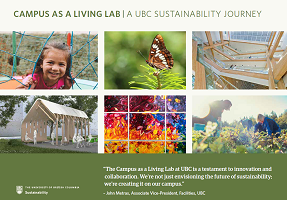What are living labs?

Experimenting on the real world
UBC’s Campus as a Living Lab provides a collaborative framework for researchers, students, operations staff and external partners to leverage the campus to explore, develop and test new ideas, and to share the knowledge gained from these experiences.
At UBC, Campus as a Living Lab encompasses a broad range of activities. These include large-scale innovative capital projects with strong research programs, academic-industry partnerships advancing R&D for new technologies, specialized applied research programs within a variety of disciplines, real-world scale research infrastructure supporting a broad range of academic research and operational benefits, and innovative student learning opportunities and programs.
Campus Living Labs are based on university properties and use academic/operational processes, infrastructure and natural assets to support applied research and innovation. They take advantage of the inherent characteristics of a university, especially the academic research expertise and the culture of experimentation. Campus Living Labs usually have explicit sustainability agendas or are closely connected with local or regional sustainable development goals, and emphasize serving the needs of the communities and societies in which they operate.
Collaboration
Living labs enable collaboration between diverse groups with a shared interest in the project or innovation. These groups are equal partners, each have a voice in the decision-making process, contribute to project development and implementation, and share the outcomes. The specific structure of each collaboration and the roles of participants is based on the project needs.
Knowledge Exchange
Living labs emphasize learning and knowledge exchange, enabling collaborators to participate in a cycle of learning and iterative improvement. One important outcome of a living lab project is the ability of collaborators to share their knowledge and experience beyond the project team.
Download the framework
For a more comprehensive overview of UBC's Campus as a Living Lab framework, featuring principles and examples, you can download the booklet below. It provides in-depth information about our approach, key projects, governance and the impact we strive to create through collaboration and innovation.
CAMPUS AS A LIVING LAB BOOKLET | A UBC SUSTAINABILITY JOURNEY
